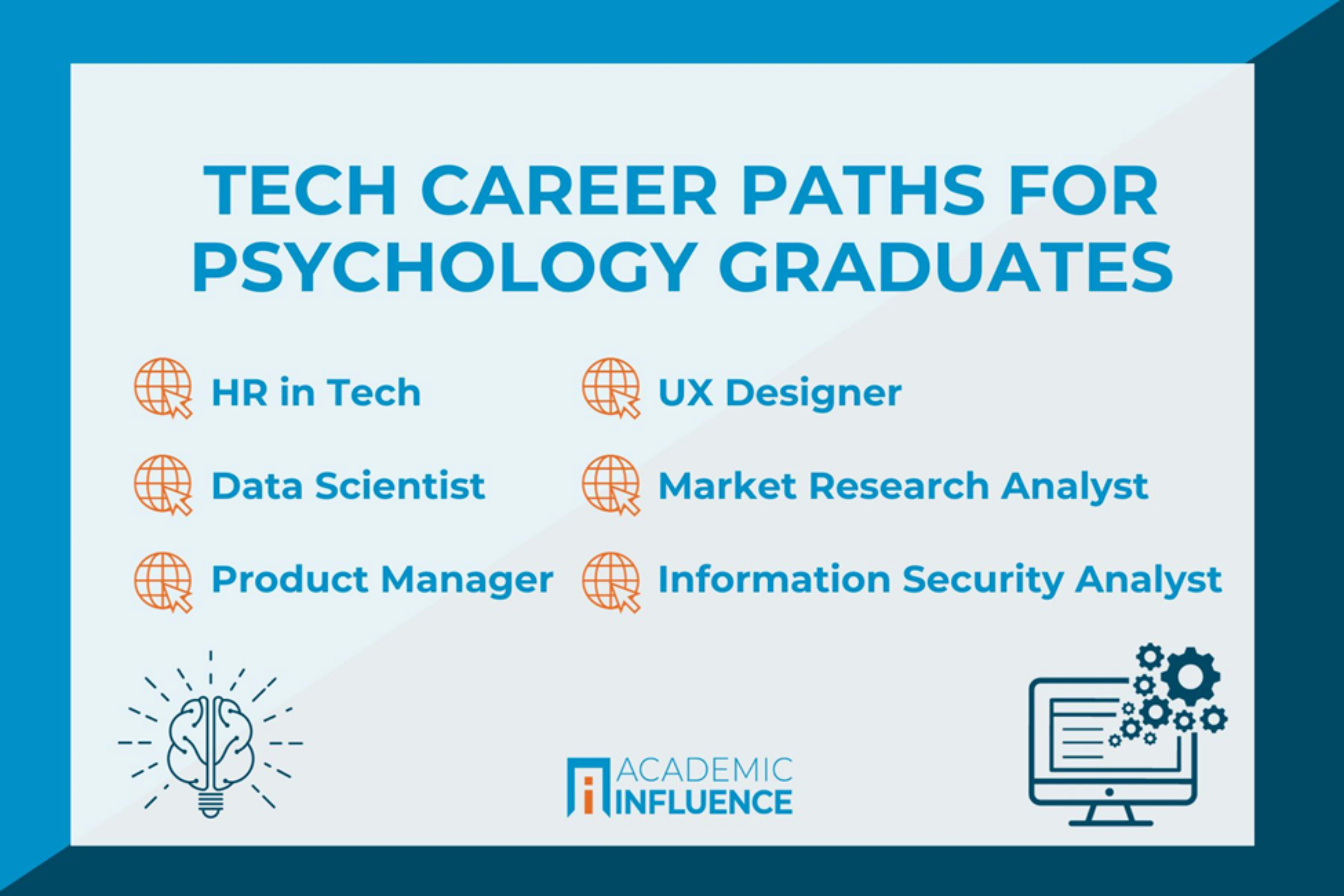How To Get Into Tech with a Psychology Degree

Key Takeaways
- Psychologists thrive on fostering good communication and teamwork in the tech industry, where collaboration is essential.
- The main responsibility of psychology graduates is to bridge the gap between technology and people.
- Transitioning from psychology to technology demands additional training, such as the foundations of IT skills, such as learning coding languages.
Many assume that technology roles require a computer science or engineering background. Aspiring psych tech professionals often wonder if their liberal arts degree will be enough to break into the industry.
Without a tech-focused education, is it possible to pivot into software development, UX design, data science, or other technical careers? The good news is that psychology graduates possess adaptable skill sets that technology companies actually desire. Let’s dive into how to leverage your psychology degree into lucrative roles in the tech space spanning AI, machine learning, human-computer interaction, and beyond.
The Value of a Psychology Degree in Tech
A psychology degree is extremely valuable in the technology business since graduates bring a unique set of talents to the table. Their in-depth knowledge of human behavior enables them to interpret users’ wants and improve user experiences. In the creation of intuitive interfaces, psychological principles, such as cognitive psychology, are used.

Psychologists thrive on fostering good communication and teamwork in the tech industry, where collaboration is essential. Overall, psychology graduates bridge the gap between technology and people, developing new solutions that are appealing to users while addressing complex societal concerns in the digital age.
Back to TopExploring Tech Career Paths for Psychology Graduates
CompTIA estimates that the technology industry contributes an astounding $2 trillion to the US economy, or more than 10% of the total. Considering this field’s amazing growth, you might be thinking about changing careers or looking at chances in this booming sector. Let’s explore some of these roles:
Information Security Analyst
Psychologists are professionals who study human behavior and improve cybersecurity by addressing user interactions and social engineering weaknesses. This psychology-related career requires great analytical skills, attention to detail, and the ability to forecast and mitigate human-centric security issues.

Data Scientist
Psychology abilities provide a distinct perspective in the field of data science. Data scientists with a psychology background excel at deciphering complicated human behavior patterns, which improves the qualitative side of data analysis.
Product Manager
By understanding the intricacies of how users interact with products, product managers can tailor features, enhance user experiences, and anticipate market trends. This insight is pivotal in developing and launching products that resonate with and meet the consumer’s evolving needs.
Human Resources in Tech
Understanding the intricacies of human behavior, motivation, and communication enables HR practitioners to build a positive workplace culture, improve team dynamics, and address issues about mental health. This psychological understanding is critical to building a flourishing and productive IT team.
Market Research Analyst
Market research analysts use psychological insights to analyze consumer behavior and preferences, which is an important aspect of analyzing market trends. Analysts use qualitative and quantitative methodologies to extract useful data from consumer decision-making, drawing on their psychological expertise.
These specialists contribute to informed market strategies by understanding the psychological factors underlying purchasing decisions, allowing firms to efficiently modify their products and communications to match consumer wants.
Want to learn more about online marketing and advertising master’s degree programs? These degree programs can help you to advance in your marketing research analyst career.
UX Designer
UX designers study user habits and preferences by applying psychological insights to market trends, ensuring that interfaces resonate with the target demographic.
This nuanced understanding of psychology enables the development of intuitive designs that attract consumers, boosting engagement and happiness while effortlessly matching changing market realities.
Back to TopBridging the Gap: Transitioning From Psychology to Tech
Transitioning from psychology to technology demands additional skills and certifications, such as coding languages or IT foundations, to improve your tech competency.
James Barham, PhD, the Vice President and Academic Editor at Academic Influence, suggests improving your resume by gaining practical experience through online projects, internships, or even boot camps:
“I’d advise psychology grads to complete an intensive, immersive coding boot camp as a launchpad into tech. Coding boot camps can condense years worth of technical skills into 3-6 months by focusing on the most prevalent languages and frameworks. Alternatively, specialized master’s programs like human-computer interaction or user experience design can blend valuable psychology knowledge with technical expertise, a compelling combination for impactful tech roles.”
Connect with professionals in technology, attend industry events, and showcase problem-solving and interpersonal skills learned in psychology.
Make the most of your psychological background by demonstrating your ability to comprehend user behavior and provide novel views in the IT realm. This creates systemic leverage over others in this competitive niche.
One of the fastest accelerated online master’s degree programs in information technology can help psychology graduates to transition into an IT career in 12-18 months.
Practical Steps for Transitioning
- Start in IT Support: Gain entry-level experience by considering roles in IT support. Apply critical thinking skills from your psychology background to troubleshoot and solve technical issues.
- Earn additional certifications: Obtain certifications like CompTIA+ to enhance your technical skill set. Showcase your commitment to learning and adapting to new technology, aligning your psychology background with IT proficiency.
- Network and collaborate: Leverage your understanding of human behavior to foster effective communication in tech teams. Network within the industry, attend events and join online communities to gain insights and opportunities.

Back to Top
Success Stories
There are many personal success stories in our world, all of which are accompanied by a recurring theme: the importance of following our passions while pursuing our dreams.
Here is the story of a young female entrepreneur, a psychology graduate currently working in the tech field.
Jennifer Van Dam: The Role of Psychology in Tech
Jennifer Van Dam is a 29 year old psychology graduate who decided to get into tech after her studies. She studied psychology during her undergrad, and then she graduated with a master’s degree in economic and consumer psychology.
She was fascinated by human interactions, especially those online, and she spent a couple of years building an app that helps people from a specific geographic area meet.
Since then, the application had been purchased by another company and Jennifer found her occupation in another enterprise: Grammarly. Thanks to her diverse background, she reached the position of “Human Connections Product Manager,” where she is able to leverage her passion for psychology while pursuing her tech dream.
Student Submitted Questions
Does Google hire psychologists?
Yes, Google employs psychologists for user experience (UX) research and design positions. Google psychologists provide their knowledge to better understand user behavior, improve product design, and make a variety of Google platforms and services easier to use and more intuitive for users.
Can you work in AI with a psychology degree?
Absolutely. A psychology degree is valuable in AI, particularly in roles focusing on human-machine interaction and AI ethics. Psychologists contribute to designing AI systems that understand and respond to human behavior ethically.
What is a cyber psychologist?
A cyber psychologist specializes in applying psychological concepts to the digital space. They analyze how people use technology, investigate how online environments affect behavior, and work to strengthen cybersecurity.
Psychology graduates interested in a tech career should embrace the fusion of human insight and technological innovation. Certifications, practical experience, and networking are your allies. Seize opportunities, continuously learn, and embark on a transformative journey where psychology and technology harmoniously converge.
If you are interested in continuing your education by pursuing an advanced degree in psychology, take a look at some of the best colleges and universities for psychology degrees in the United States. Many of these schools also offer online degree programs that are convenient and accessible to busy working professionals who are seeking a master’s degree in psychology.